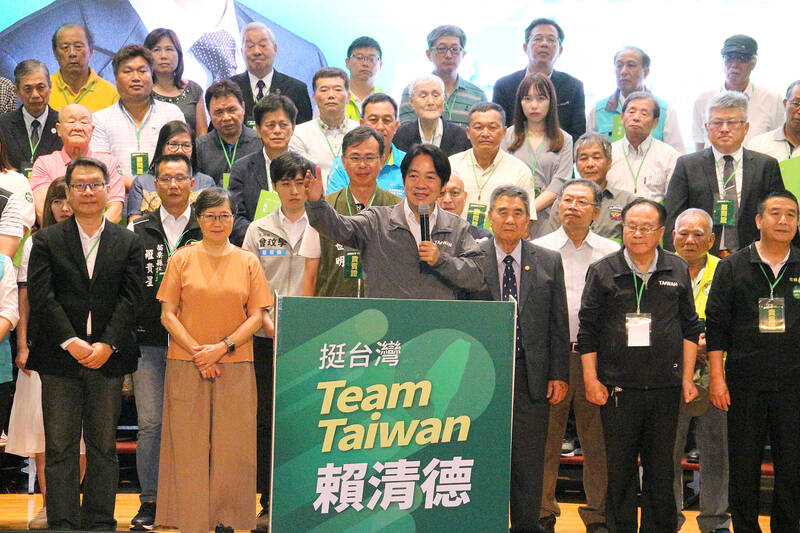Accepting Beijing’s “one China” principle and the so-called “1992 consensus” would be tantamount to Taiwan giving up its sovereignty, Vice President William Lai (賴清德) said in Miaoli County yesterday.
Lai, the Democratic Progressive Party’s (DPP) presidential nominee, made the remarks at the launch of a campaign group, while expressing his continued support for the “status quo” in the Taiwan Strait.
Taiwan would grow and move forward if it upholds its sovereignty, he said.

Photo: Tsai Cheng-min, Taipei Times
Taiwan would regress to autocracy if voters accept the “one China” principle or the “1992 consensus,” Lai said, adding that only when there is sovereignty is there true peace.
On Saturday, at another campaign event in Chiayi City, Lai accused China of fear-mongering about a potential war to lead Taiwanese to select a political party that it favors.
Lai urged Taiwanese voters to use their ballots to counter the Chinese Communist Party (CCP) in the presidential election scheduled for Jan. 13 next year.
If Taiwan lets China dictate its election results, it would be the end of the road for democracy, he said.
If a war breaks out, it would be because of a dictatorship, not the DPP, he said.
As Taiwan faces growing military threats from China, people have to take them seriously and not bow to the Chinese dictatorship, he said, adding that if Taiwan’s election results in the wrong choice, there would be no way to return.
The presidential election is not a decision between war and peace, he added.
The “1992 consensus” — a term that former Mainland Affairs Council chairman Su Chi (蘇起) in 2006 admitted making up in 2000 — refers to a tacit understanding between the Chinese Nationalist Party (KMT) and the CCP that both sides of the Taiwan Strait acknowledge that there is “one China,” with each side having its own interpretation of what “China” means.
The DPP rejects the “1992 consensus,” saying that agreeing to it implies acceptance of China’s claim over Taiwan. It has also drawn a parallel between the “1992 consensus” and Beijing’s “one country, two systems” formula for Taiwan, but there is no evidence that Beijing demands Taiwan to accept the latter for relations to be restored.
There has been a virtual freeze in cross-strait relations since 2016, when President Tsai Ing-wen (蔡英文) took office and rejected the “1992 consensus” that had underpinned closer cross-strait ties during the KMT administration of president Ma Ying-jeou (馬英九) from 2008 to 2016.

Snow fell in the mountainous areas of northern, central and eastern Taiwan in the early hours of yesterday, as cold air currents moved south. In the northern municipality of Taoyuan, snow started falling at about 6am in Fusing District (復興), district head Su Tso-hsi (蘇佐璽) said. By 10am, Lalashan National Forest Recreation Area, as well as Hualing (華陵), Sanguang (三光) and Gaoyi (高義) boroughs had seen snowfall, Su said. In central Taiwan, Shei-Pa National Park in Miaoli County and Hehuanshan National Forest Recreation Area in Nantou County saw snowfall of 5cm and 6cm respectively, by 10am, staff at the parks said. It began snowing

Global bodies should stop excluding Taiwan for political reasons, President William Lai (賴清德) told Pope Francis in a letter, adding that he agrees war has no winners. The Vatican is one of only 12 countries to retain formal diplomatic ties with Taiwan, and Taipei has watched with concern efforts by Beijing and the Holy See to improve ties. In October, the Vatican and China extended an accord on the appointment of Catholic bishops in China for four years, pointing to a new level of trust between the two parties. Lai, writing to the pope in response to the pontiff’s message on Jan. 1’s

HOLIDAY EXERCISE: National forest recreation areas from north to south offer travelers a wide choice of sights to connect with nature and enjoy its benefits Hiking is a good way to improve one’s health, the Forestry and Nature Conservation Agency said, as it released a list of national forest recreation areas that travelers can visit during the Lunar New Year holiday. Taking a green shower of phytoncides in the woods could boost one’s immunity system and metabolism, agency Director-General Lin Hwa-ching (林華慶) cited a Japanese study as saying. For people visiting northern Taiwan, Lin recommended the Dongyanshan National Forest Recreation Area in Taoyuan’s Fusing District (復興). Once an important plantation in the north, Dongyanshan (東眼山) has a number of historic monuments, he said. The area is broadly covered by

A Vietnamese migrant worker on Thursday won the NT$12 million (US$383,590) jackpot on a scratch-off lottery ticket she bought from a lottery shop in Changhua County’s Puyan Township (埔鹽), Taiwan Lottery Co said yesterday. The lottery winner, who is in her 30s and married, said she would continue to work in Taiwan and send her winnings to her family in Vietnam to improve their life. More Taiwanese and migrant workers have flocked to the lottery shop on Sec 2 of Jhangshuei Road (彰水路) to share in the luck. The shop owner, surnamed Chen (陳), said that his shop has been open for just